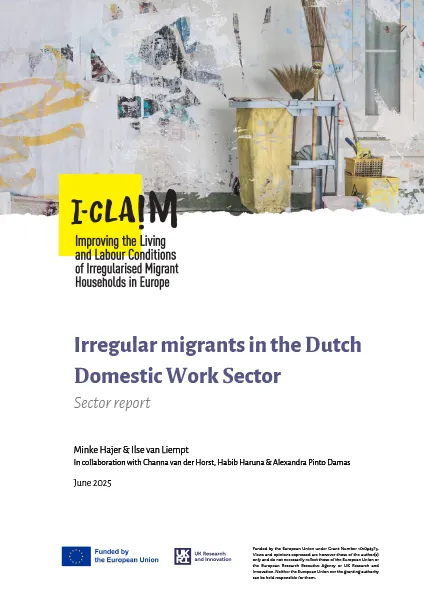Irregular migrants in the Dutch Domestic Work Sector
Minke Hajer & Ilse van Liempt
How to cite:
Hajer, M., & van Liempt, I. (2025). Irregular migrants in the Dutch Domestic Work Sector. I-CLAIM. DOI: https://doi.org/10.5281/
Irregular migrants in the Dutch Domestic Work Sector
Minke Hajer & Ilse van Liempt
Domestic work is a sector that offers employment to many irregular migrants in the Netherlands. As migrants cannot legally work without a residence permit, their options are mostly limited to sectors such as cleaning, construction, or delivery. Domestic work is one of the least regulated sectors due to the Regeling Dienstverlening aan Huis, which exempts private employers from many formal obligations if they employ someone for less than four days a week. This deregulation has created a legal grey area where many employers are unclear about their responsibilities.
Domestic work is, therefore, a common job sector for irregular migrants in the Netherlands. Interviews with workers in Utrecht reveal a variety of paths into the sector. Some arrived planning to work in domestic jobs, while others turned to cleaning after losing legal status or when their asylum claims were rejected. Workers vary in how central domestic work is to their livelihoods; some have ten clients and earn around €15-€18 per hour, while others work sporadically and may live in shelters. Jobs are typically found through informal networks, especially strong among Brazilian, Filipino, and Indonesian communities.
The employer-employee relationship between domestic workers and their employers is largely shaped by trust and physical absence. Most cleaners work while employers are away, using keys or hidden entry methods, and are paid informally. Trust, often based on referrals, is a central component of this system. Nevertheless, sometimes, personal bonds formed with those employers who were home. However, these blurred lines between work and friendship sometimes also complicate negotiations about pay and workload, which, in general, were difficult to negotiate. Irregular status limits workers’ ability to negotiate even more.
